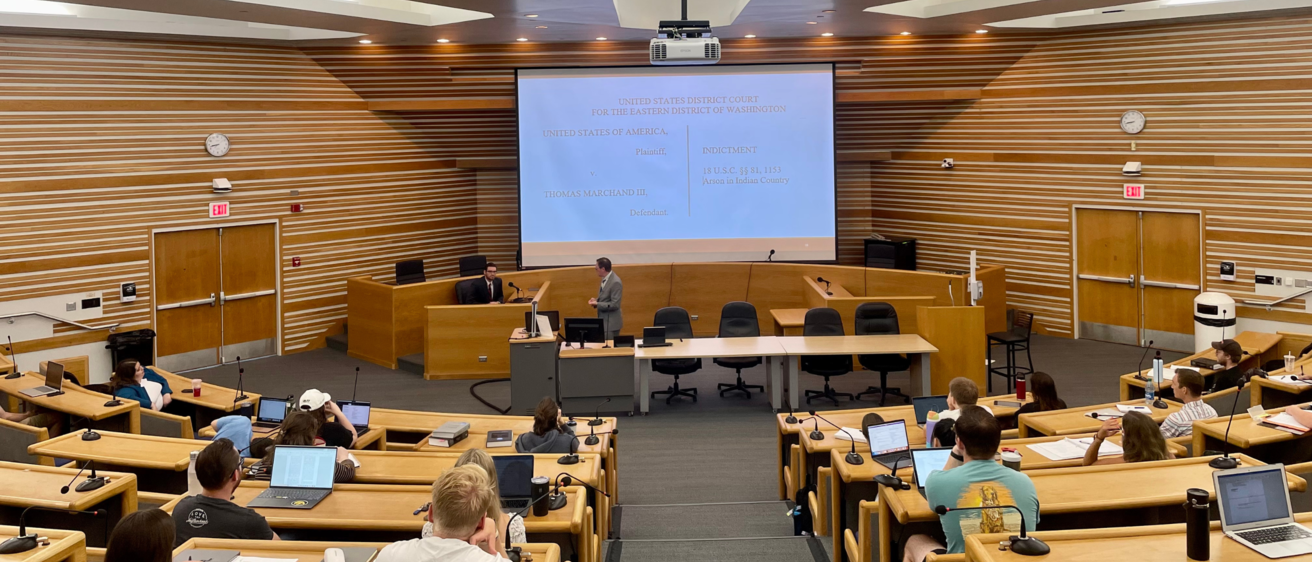Recognizing the limitations of theoretical teachings in her Criminal Procedure Adjudication course, Professor Guernsey, a seasoned federal defense attorney, faced the challenge of not having direct access to the grand jury room in the federal system.
Despite having previously invited prosecutors to share their insights, Professor Guernsey wanted to give her students a firsthand encounter with the grand jury process. Collaborating with Richard Barker, the First Assistant to the U.S. Attorney for the Eastern District of Washington, she proposed and successfully implemented an immersive grand jury simulation at Iowa Law.
“It’s a fairly unique experience because the grand jury is a secret proceeding,” says Guernsey. “So, while this was a simulation, it’s not very common that anyone – including me – gets a realistic view of what happens behind closed doors from the people who regularly present cases to the grand jury.”
Utilizing a real case as a template, Barker and local Assistant U.S. Attorney Matt Stone from the Southern District of Iowa, engaged the students as the grand jurors. This unique approach allowed students to actively participate in the simulation, gaining valuable insights into the workings of a grand jury and enhancing their understanding of criminal procedure.
“Prosecutors have an important and unique responsibility to protect the integrity of the grand jury and to ensure that any evidence presented is fair and accurate,” First Assistant U.S. Attorney Barker stated. “While federal law places strict restrictions on the disclosure of certain grand jury materials, these restrictions do not prevent us from discussing the grand jury process more generally.” Barker added, “I was so impressed with thoughtful questions and insights from the Professor Guernsey’s students. By ensuring that future defense attorneys and prosecutors are better able to understand the grand jury process, we can make improvements and better protect the rights of victims and those accused of federal crimes.”
Anelisa Sandoval, a 3L student interested in public defense work, expressed the value of the experience.
"Being able to watch a grand jury simulation was extremely valuable. I had never seen a grand jury before or even knew how it operated,” says Sandoval. “Having the opportunity to actually see how a grand jury would play out and being able to ask an attorney questions about the process was invaluable."
Dan Wozniak, another 3L student, echoes Sandoval’s appreciation for the experience.
"The grand jury simulation gave me a new perspective on the deference given to prosecutors, Wozniak says. “To ensure public order and the effective administration of justice, prosecutors and law enforcement officers need a certain degree of autonomy. However, by deceptively framing evidence, heavily relying on hearsay evidence, and withholding exculpatory evidence, prosecutors can—as Judge Sol Wachtler famously said—convince a grand jury to ‘indict a ham sandwich’ if they want an indictment. This experience confirmed that more should be done to protect the rights of the accused."
The collaborative effort between Professor Guernsey and Mr. Barker exemplifies Iowa Law’s dedication to innovative teaching methods that offer students a more practical and engaging learning experience. To learn more about Iowa Law’s experiential learning initiatives, please visit law.uiowa.edu/experiential-learning.
